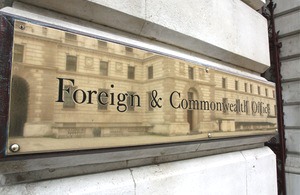5th April 2013 Tashkent, Uzbekistan
Arms Trade Treaty was approved by the UN General Assembly on Tuesday
 I was very pleased to see that the Arms Trade Treaty was approved by the UN General Assembly on Tuesday. This is the culmination of getting on for ten years of work by nations committed to better control of the international arms trade, and by NGOs and religious groups who have campaigned relentlessly to push governments to take action. The history of attempts to control conventional arms sales through the UN goes back at least to the late 1980s and the introduction of a UN arms transfer register. That only covered major weapons systems. The new treaty places duties on the suppliers of all kinds of conventional arms not to export them if there is a serious risk that they would be used for acts of genocide, crimes against humanity or serious human rights violations or war crimes, and to prevent arms from getting onto the black market or into the hands of terrorists.
I was very pleased to see that the Arms Trade Treaty was approved by the UN General Assembly on Tuesday. This is the culmination of getting on for ten years of work by nations committed to better control of the international arms trade, and by NGOs and religious groups who have campaigned relentlessly to push governments to take action. The history of attempts to control conventional arms sales through the UN goes back at least to the late 1980s and the introduction of a UN arms transfer register. That only covered major weapons systems. The new treaty places duties on the suppliers of all kinds of conventional arms not to export them if there is a serious risk that they would be used for acts of genocide, crimes against humanity or serious human rights violations or war crimes, and to prevent arms from getting onto the black market or into the hands of terrorists.
In previous postings with the Foreign Office I’ve worked in countries emerging from civil conflict and have seen the results of easy availability of small arms: in lives lost, in people living with terrible injuries, in destructive civil wars that in the end achieve nothing, but set back their countries’ development by years or decades, in powerful criminal groups that operate in nobody’s interest but their own. It’s a popular truism that weapons don’t cause wars, but in reality the easy accessibility of arms makes it much easier for political or ethnic tensions to spill over into violence and bloodshed, or for conflicts to continue remorselessly and beyond reason.The new treaty is a step towards greater control of the flow of arms and to reducing the likelihood that they will fuel conflict or crime.
There’s still a long way to go: to start with, the treaty must be ratified and implemented. But I join Oxfam, Amnesty International and many others in welcoming the passage of the Treaty as a step towards a rules-based arms trade, and an example of what can be acheived through the actions of civil society and the commitment of governments.